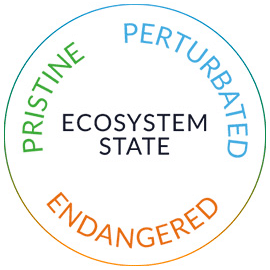ECOLOGICAL RESTORATION
A coastal ecological engineering solution
Reconciling economic development and preservation of the environment is a moral duty and an obligation imposed by law. Currently, all ecosystems are under anthropogenic (= human-made) pressure in addition to natural disturbances. Too strong or too long accumulations of these disturbances can slow down the regeneration of an ecosystem or even prevent it from returning to its previous state even if all the pressures are removed, we speak then of catastrophic transition: the resilience capacities of ecosystem, defined by its own threshold, are exceeded.
Faced with an ecosystem in the process of degradation, prevention and non-degradation actions are to be favored. Ecological restoration can only be considered if the cause of degradation has been removed … otherwise it will be doomed to failure. It must be carried out in parallel with management and protection measures.
Ecological restoration is assistance in the recovery, regeneration or self-regeneration of a damaged, degraded or destroyed ecosystem (SER, 2004). The implementation of such actions requires a good ecological and biological knowledge but also in materials, and site management, in order to obtain the expected results. Ecological restoration in the marine environment is still a new discipline that is fueled by experimentation.
The methods used in ecological restoration vary depending on the state of the target ecosystem, the target referenced ecosystem and the causes of degradation. In order to restore an ecosystem and its disappeared or degraded functionalities, it may be proposed to clean up the site (removal of silt, waste, etc.), eradication of species, transplantation of species or the introduction of artificial habitats.
Through its experience, the theoretical and practical skills of its team and its research collaborations, Andromède Océanologie has many assets to carry out your ecological restoration projects.
Among our accomplished projects, let us quote the de-burial of a coral reef in Cap-Ferrat (RESCOR program), the elimination of an invasive exotic alga (Caulerpa taxifolia, 14 150 m²) on a 10 ha site area, transplanting 500 m² of posidonia meadows, transplanting 16,000 beams (150 m²) of posidonia in a protected area (REPIC program)…


